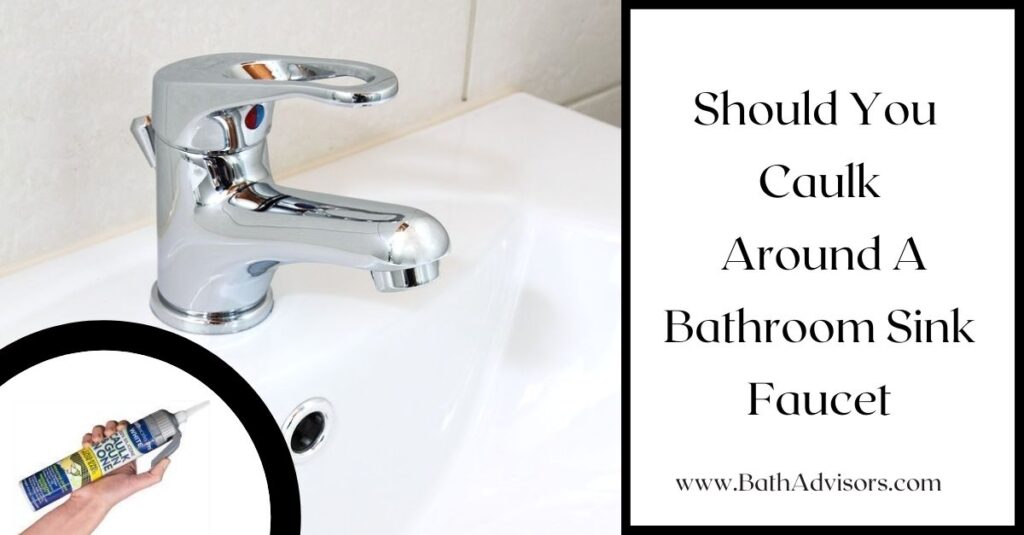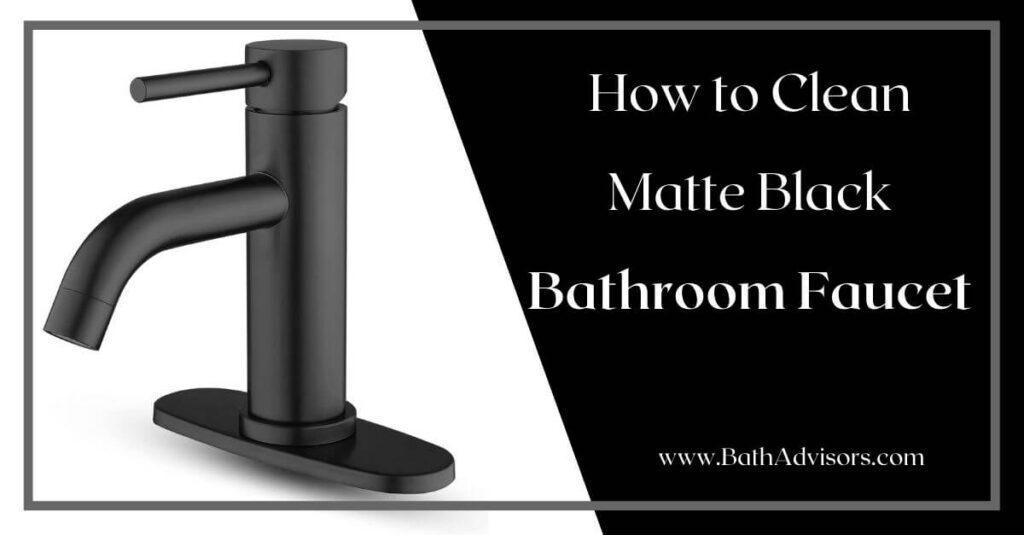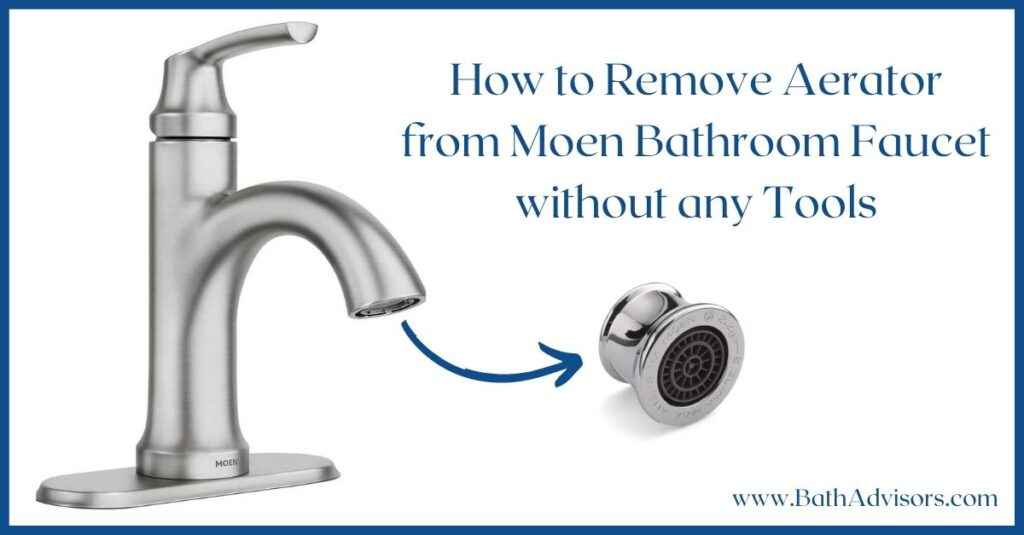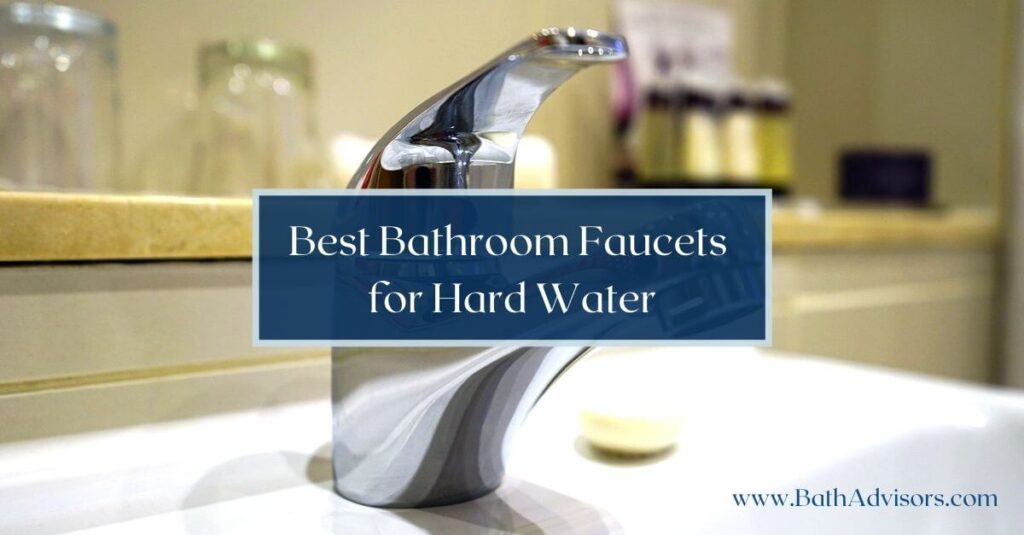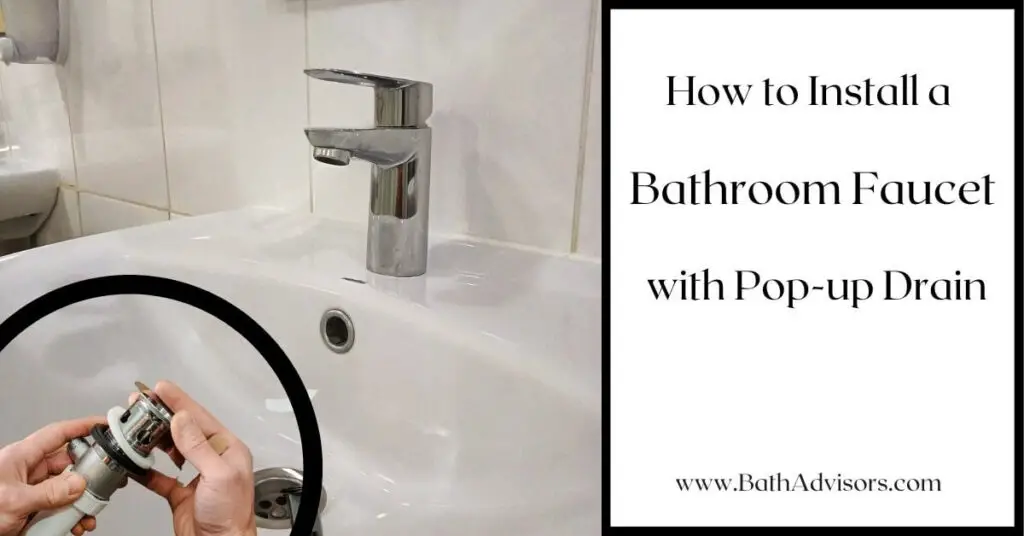Hard water stains can quickly turn your beautiful bathroom faucet look ugly, and you cannot deny that! Unfortunately, in the case of matte black faucets, these stains are just the worst.
Faucets only look good when they shine, and to restore their sheen, you need to clean them the right way. Still, wondering how to remove hard water stains from bathroom faucets?
Rinse the faucet with water, and then apply a mild soap + water solution on it. Rub for a few minutes using a soft sponge to get the stains off, and rinse the faucet again using lukewarm water. Use a paper towel to dry it completely.
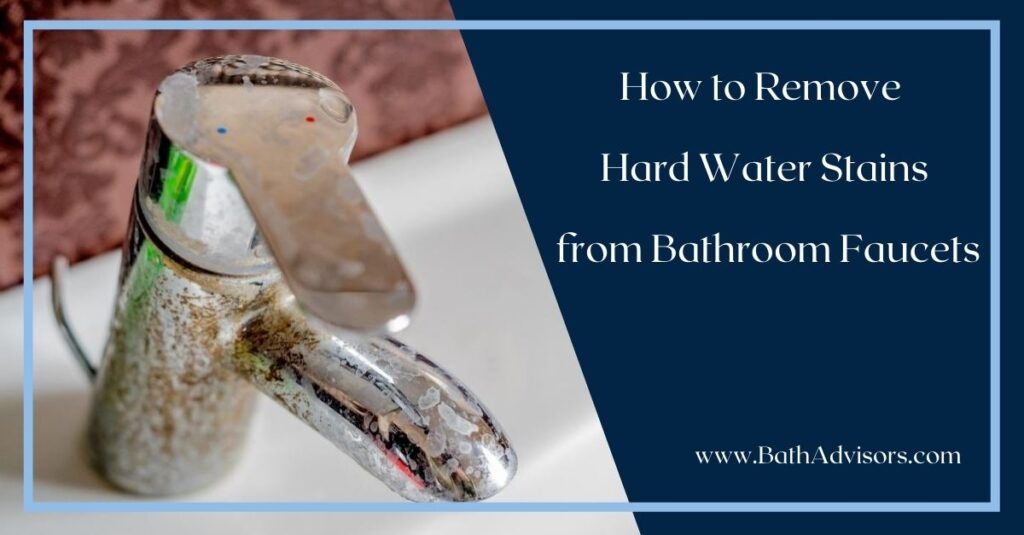
In this post, I’ve listed the exact process I have been using to keep my bathroom fixtures spick and span. Moreover, I’ve listed some tips to prevent hard water stains on faucets so that you don’t have to spend a lot of time cleaning them.
What is Hard Water?
Before I hop on the cleaning process, it is important to know about hard water and what causes stains on the faucet. As per the U.S. Geological Service, the hardness of water can be determined by the amounts of minerals dissolved in it.
In a nutshell, hard water contains higher amounts of dissolved minerals, including magnesium and calcium. But why does hard water leave stains on the faucet?
The answer is simple. When hard water evaporates, it leaves the minerals behind, which then dry and form a layer over the faucet. The stubbornness of the stains depends on how hard the water is.
It’s easy to tell if you have hard water flowing, and you can quickly conduct a test to find out the hardness of the water.
But before that, you should know the scale rank of hard and soft water. I’ve created a table below to help you understand it better.
How to Tell If You Have Hard Water?
The easiest sign to tell that your house or area has hard water is seeing stains on the faucets and other bathroom fixtures. However, there are some other methods that will give you sure-shot results.
1. Do the Lather Test
A lather test is the easiest way to determine if you have hard water. But it only shows results if the water has a very hard nature and has a lot of impurities dissolved.
Take a bottle with some water, and add a few drops of liquid soap to it. Shake well, and then see the lather. If the water takes more time to form lather, you have hard water.
2. Inspect the Hot Water Tank
We all have hot water tanks around the house, either on the terrace or in other places. You need to check the tank and look for signs of scale and sludges. You will see a thick white layer inside the tank. It also shows your house has hard water.
3. Do a Hardness Test

This is the only solution if you need accurate results and are serious about getting hard water stains off the faucets. You need to buy a hardness kit like Premium Water Hardness Test Kit, as it gives precise results.
Take some tap water in a bowl, and place one strip in it. Now, wait for some time till the strip changes its color. Match the strip color to the color chart over the strip’s bottle to determine the exact hardness of the water.
How to Remove Hard Water Stains from Bathroom Faucets – Step by Step
Removing hard water stains from bathroom faucets is not that hard, but it involves using the right ingredients. Also, you need to be gentle since scrubbing hard can lead to scratches all over the beautiful faucets.
Here are some easy steps you need to follow to get rid of the stubborn hard water stains from bathroom taps.
Step 1: Gather the Required Items
- White vinegar
- A clean rag
- Non-scratch sponge
- A soft-bristle brush
- Paper towels
- Baking soda
- Mild dishwashing liquid
- Spray bottle
Step 2: Prepare a Cleaning Solution (Not for matte black faucets)
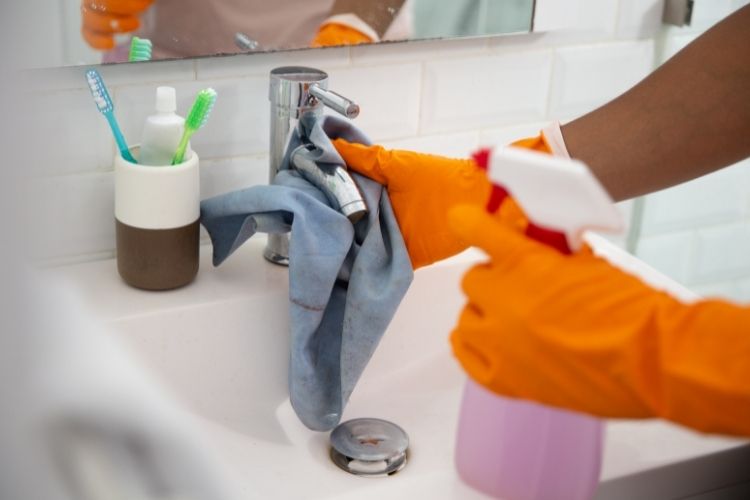
Take a spray bottle and mix equal parts of white vinegar and water. Vinegar is an effective cleaner and can quickly loosen the grip of hard water stains. After preparing the solution, shake it well, and spray it over the entire faucet from the handle to the aerator and base.
Let the solution sit for at least 60-minutes so that it can do its wonders. You can even use a towel damped in this solution wrapped around the faucet for better results.
Do not spray vinegar on matte black faucets since the acidic properties can lead to damaging the finish. For these faucets, you can simply rinse them and then rub them gently with your hands to remove the stains.
Step 3: Rinse the Faucet
Take a bowl of lukewarm water, and add a few drops of mild dishwashing liquid to it. Mix well, and dip a soft non-scrub sponge into it. Scrub the faucets well, and try to remove the hard water stains.
I prefer cleaning the fixtures in a circular motion, as it gives better results. This solution works well for matte black faucets also, but be a little gentler when scrubbing with the sponge. Rinse the faucet again, and see if the stains have gone.
Note: If the stains are still there, you need to follow the next step, which helps remove stubborn hard water stains.
Step 4: Use Baking Soda

If you are wondering how to remove hard water buildup from the faucet, you need to use baking soda. Baking soda is very good at cleaning stains as it is a bit alkali in nature so it easily dissolves the stubborn grime. Make a thick paste by mixing 3-4 tablespoons of baking soda into some water. Apply it on the areas you see stains on, and let it sit for around 5 hours.
You can also apply baking soda on matte black and other finishes because of its basic nature.
Step 5: Rinse with Warm Water
Pour lukewarm water over the faucet, and rub it gently to remove the thick paste. Do not use a sponge because the granules present in baking soda can cause scratches. After rinsing the entire faucet, dry it using soft paper towels and you are good to go.
Ways to Prevent Hard Water Stains on Bathroom Faucets
So, you have successfully removed hard water stains from bathroom faucets; what now? Now you have to protect the faucets from hard water stains so that the fixtures look beautiful every day.
Below I’ve listed some tried-and-tested tips you can use to prevent hard water stains on the faucets.
1. Use a Water Softener
If your area has hard water, there is nothing that can stop the formation of hard water stains. However, getting a water softener installed will help a lot.

Water softeners are designed to remove minerals and other deposits from the water, resulting in reducing the stains. You can either get the water softener installed with the main supply line or for the particular pipeline that takes water to the bathroom.
2. Clean Frequently
Even if you take a lot of care of the faucets, there may be someone, be it your kids or parents, undermining your efforts. A few drops of water can also leave stains over the faucet, so frequent cleaning is a must.
Follow a basic faucet-cleaning regime that includes using a mild liquid soap and some lukewarm water.
3. Keep the Faucet Dry
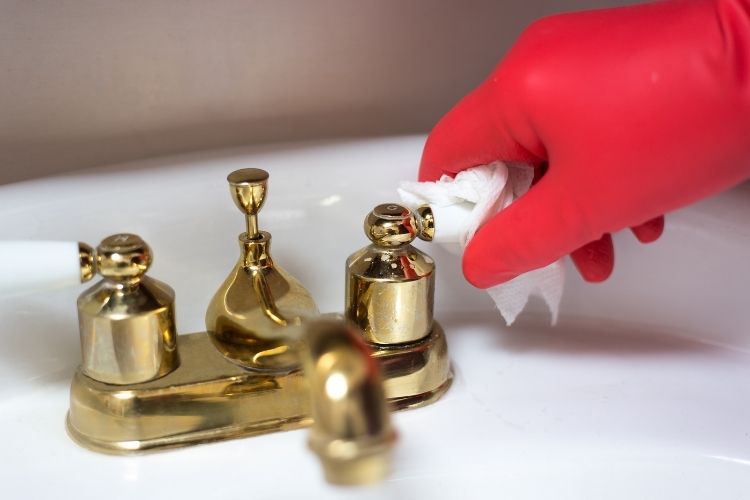
Keep the faucets dry every day, and do not let water droplets sit on them. Use a paper towel and dry the fixture completely. You have to do it during the night when you won’t be using the faucet for at least 4-5 hours or even more.
FAQs
Q1: What Dissolves Hard Water Deposits?
Baking soda is very good at dissolving hard water deposits. Apply a little amount of baking soda and water paste over the faucet. Let it sit for some time and rinse gently.
Q2: Will Vinegar Damage Finish on the Bathroom Faucet?
Vinegar usually does not damage the finish and helps remove the stains. But when it comes to faucet finishes like matte black, you cannot use vinegar. However, it works well on chrome, bronze, brass, and other common types of faucet finish.
Q3: Does WD-40 Remove Hard Water Stains?
Yes, WD-40 is an effective cleaner when it comes to removing calcium deposits or hard water stains from the faucet. However, I do not recommend using it regularly since the chemicals can have an impact on the faucet’s finish.
Only use natural cleaners such as vinegar or baking soda to make the faucet look clean and like-new for years.
Q4: Does Hard Water Stains Damage the Faucet’s Finish if not Removed?
No, the stains do not damage the finish, but they can become permanent if not cleaned on time. You should always clean these stains properly in order to make the faucet look beautiful.
Q5: Does CLR Remove Water Stains?

Yes, CLR has the properties to remove hard water stains and is somewhat similar to WD-40. Only use CLR if the stains are stubborn, and you are not able to remove them with any regular cleaner.
Final Thoughts
Removing hard water stains from bathroom faucets is essential to make the fixtures look new and beautiful. And after following this detailed regimen, you can quickly get the stains off without damaging the finish.
Before cleaning the entire faucet, always do a patch test to understand how the finish will react to the materials you use. Lastly, it would be great to check out the instruction manual to know more about cleaning the faucet.


